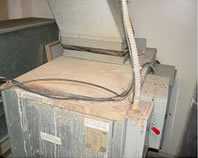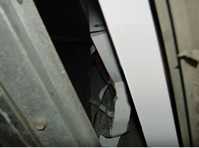INDOOR ENVIRONMENTAL QUALITY
What workers can do
When workers suspect their health problems are caused by poor ventilation in their work areas, workers should:

Main building units in need of cleaning, maintenance or repair.
- Report concerns immediately to supervisors or those persons responsible for building maintenance.
- See their doctor for proper diagnosis and treatment.
What management and building owners can do
When workers suspect their health problems are caused by exposures from ventilation in their work environment, owners and managers should:
- Always respond when occupant health concerns are reported.
- Establish clear procedures for recording and responding to IEQ complaints to ensure an adequate and timely response.
- Log all complaints or problem reports.
- Collect information about each complaint.
- Ensure confidentiality.
- Determine a plan for response.
- Identify appropriate resources for response.
- Apply remedial action.
- Provide feedback to building occupants regarding the complaint and response actions.
- Follow-up to ensure that remedial action has been effective.
- Regularly clean or replace HVAC system filters -
Use the most efficient filters possible while still maintaining the ability to supply adequate air flow to the spaces. Ensure that filters are installed in the correct orientation relative to airflow, that they are the appropriate size, and that they are seated in the filter rack properly. Take precautions to minimize air flowing around the filters instead of through them.
An improperly sized filter stuffed into a unit.
- Regularly inspect outdoor air intakes -
Open all outdoor air intakes that are closed. Adjust or repair those that are not working properly. Regardless of the air flow required for heating and cooling, the minimum outdoor air flow recommended by ASHRAE should always be provided to each space. - Regularly inspect office building exhaust fans to make sure all are working properly -
Dysfunctional exhaust fans can result in suboptimal pressure differences throughout the building and can create or exacerbate IEQ problems. - Use less conservative cycle times for the HVAC system -
Start the HVAC system earlier in the morning before workers arrive to reduce temperature fluctuations and control humidity levels. Simply providing a more thermally-
comfortable working environment may reduce the number of IEQ complaints. - Never store paints, cleaners, or other chemicals in HVAC equipment rooms -
Odors and potentially harmful vapor contaminants can easily be circulated throughout the entire space being supplied by an HVAC system.
HVAC checklists to assist with maintenance and record keeping from USEPA/NIOSH Building Air Quality: A Guide for Building Owners and Facility Managers:
- Page last reviewed: September 1, 2015
- Page last updated: September 1, 2015
- Content source:
- National Institute for Occupational Safety and Health Respiratory Health Division


 ShareCompartir
ShareCompartir